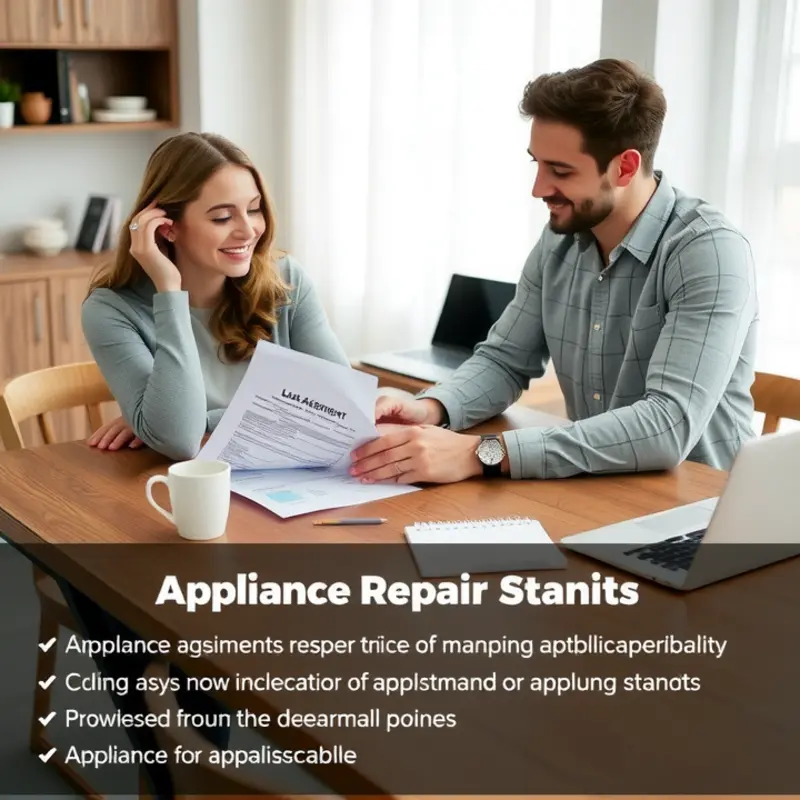As a young professional, first-time renter, or student, navigating your lease can often seem daunting. One crucial area that deserves your attention is your rights regarding appliance repairs. Whether you’re coping with a malfunctioning refrigerator or a broken air conditioner, knowing what to expect from your landlord—and what is expected of you—can alleviate stress and save you money. Lexicon and legal jargon can be intimidating, but understanding your rights as a renter can lead to seamless communication with your landlord and quicker repairs. This guide is designed to provide practical insights into the typical responsibilities outlined in rental agreements and how you can advocate for yourself. From understanding repair timelines to knowing your options if repairs are neglected, being informed can empower you to make well-rounded decisions when issues arise. With the right information at your fingertips, you can focus on ensuring your living space remains comfortable and functional.
Decoding Your Lease: Appliance Repair Responsibilities

When you’re renting for the first time, understanding the specifics of your lease can be daunting. Yet, among the key sections to clarify are those involving appliance repair responsibilities. A clear grasp of what your lease says about this can help prevent misunderstandings and ensure your rights and duties are clear.
First, examine the section of the lease where maintenance obligations are outlined. The lease will generally specify which appliances are included in your rental and who is responsible for repairs. This coverage can vary widely depending on the landlord, building type, and even geographic location.
Common Lease Terms: Familiarize yourself with terms like “standard wear and tear,” which refers to normal deterioration expected over time. Your landlord is typically responsible for repairs that fall under this category. However, if an appliance breaks due to negligence or misuse on your part, you may be financially responsible.
Leases might also feature clauses stating that all repairs must be reported immediately. It’s crucial to adhere to this, as failure to report can sometimes shift the repair burden onto the tenant. Look for a “repair and deduct” clause. This clause allows you to arrange appliance repairs yourself and deduct the cost from your rent if the landlord fails to respond within a reasonable time. Be sure you understand the qualifications for such actions to avoid conflicts.
Landlord Obligations: Expect your landlord to maintain essential appliances in good working order, especially those critical to health and safety, like heating systems or stoves. In many jurisdictions, laws mandate that landlords handle all necessary repairs, regardless of lease stipulations, ensuring the property remains habitable.
In some leases, landlords may retain responsibility only for specific appliances. For instance, built-in appliances like dishwashers might fall under the landlord’s purview, while portable ones like microwaves might not.
For renters eager to grasp more, understanding local tenant laws is crucial. These laws often supersede lease agreements, providing a baseline of landlord responsibilities. For example, in certain areas, landlords must respond to repair requests within a specific time frame, impacting how lease terms are interpreted.
Tenant Responsibilities: Your role typically involves basic maintenance to ensure appliances are not misused. For example, clean filters regularly to prevent blockages and follow manufacturer guidelines. Ignorance of such upkeep might result in tenants bearing the repair costs.
Having an open dialogue with your landlord can be invaluable. If the lease is unclear about a particular appliance, seek clarification before signing. Ask whether repairs will be done by professional technicians and if there are specific service providers you should use for issues that fall under your purview.
Empowerment for first-time renters comes from knowing where you stand. Understanding your lease in detail, especially regarding appliance repair obligations, plants confidence. You can learn more about managing responsibilities in rented spaces by visiting How to Resolve Rental Billing Errors, which guides you on addressing various leasing challenges.
This foundational understanding ensures smoother interactions and a happier renting experience, laying the groundwork to enjoy your new home without the stress of unexpected repair costs.
Steps to Take When Appliances Break: Your Action Plan

When an appliance breaks in your rental, swift and structured action is key. Here’s a practical guide to ensure your appliances are repaired efficiently and effectively, keeping your home functional and stress-free.
First, promptly notify your landlord. Document the issue with clear photos or videos and submit a detailed report. Ensure you include when the problem began and how it affects your daily life. Sending notices via email ensures there’s a written record. If your lease agreement specifies another preferred method of communication, adhere to those terms but still follow up with an email.
Understanding repair timelines is crucial. Typically, landlords are required to address urgent repairs, such as those affecting health and safety, more quickly than non-urgent issues. If you’re unsure about these timelines, check your local housing regulations and the terms stipulated in your lease. Familiarize yourself with what constitutes “reasonable time.” Often, it can vary from 24 hours for urgent repairs to a couple of weeks for less critical issues.
If your landlord does not respond in a reasonable time, escalate your actions. Send a follow-up email and reiterate the urgency, referencing any local codes or the lease agreement to strengthen your case. If the delay continues, consider options such as contacting your local housing authority for guidance on tenant rights in unresolved repair disputes.
When repairs are delayed despite following these steps, explore temporary workarounds. For instance, if your washing machine is out of commission, consider using nearby facilities or investing in apartment-friendly DIY cleaning products. Not only does this maintain your comfort, but it also demonstrates to your landlord that you’re taking proactive measures. For more creative and practical solutions, you can explore safe and efficient apartment laundry habits.
Keep thorough records of all communications and attempts to resolve the issue. Document each interaction with landlords and maintenance personnel, including dates and details of the conversation or actions taken. This information can be invaluable if further action, such as mediation or legal processes, becomes necessary.
Ultimately, tackling appliance breakdowns in a rental requires clarity, persistence, and sound knowledge of your rights and obligations. By taking these structured steps, you ensure not only the swift repair of your home essentials but also maintain a positive and cooperative relationship with your landlord.
Final words
Understanding your rights as a renter regarding appliance repairs is essential for your peace of mind. By becoming familiar with your lease agreement and the steps to take when issues arise, you not only empower yourself but also foster a better relationship with your landlord. Remember, effective communication is key; ensure you document everything and keep an open line for dialogue. Whether you’re a first-time renter or a seasoned tenant, standing up for your rights can lead to prompt resolutions and a more comfortable home environment. Don’t hesitate to seek help or legal advice if needed—your rented space should feel like home, and it’s your right to ensure it does.









